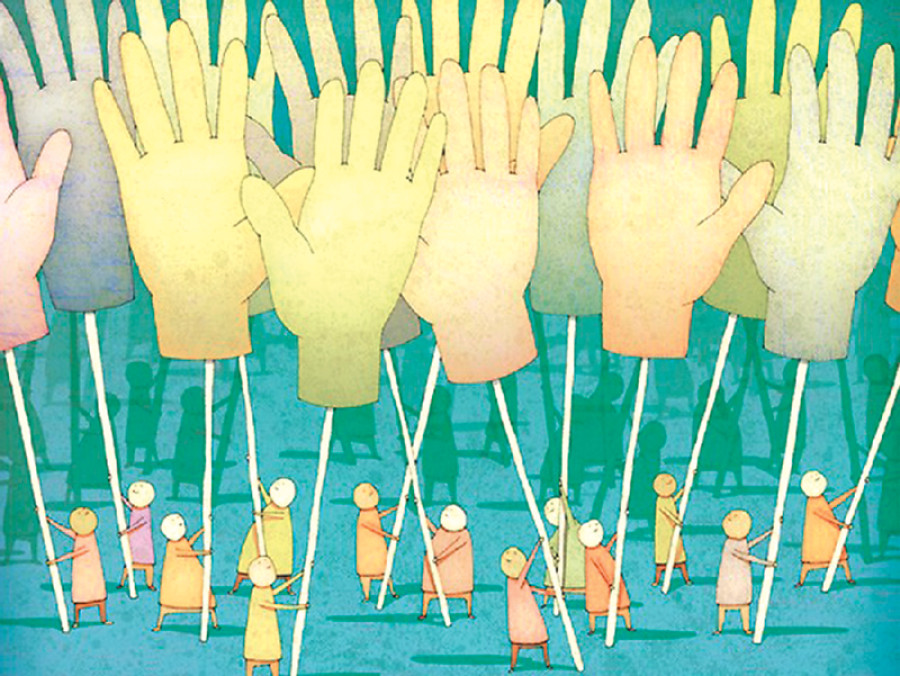Opinion
Working together
Volunteerism in Nepal is at a critical juncture. Occasionally praised but more often neglected and forgotten, Nepal is losing a great opportunity to harness the power of service.
Simone Galimberti
Volunteerism in Nepal is at a critical juncture. Occasionally praised but more often neglected and forgotten, Nepal is losing a great opportunity to harness the power of service.
Once in a while, we read about new initiatives aimed at mobilising volunteers for different development purposes and about thousands of volunteers having an impact at the grassroots level. While any programme mobilising volunteers should be welcomed provided certain ethical standards and practices are upheld, this “utilitarian” approach could also be short-sighted and limited in its scope of action and broader impact. Therefore, it is time the government prepared a comprehensive strategy to harness the potential of volunteers in the country and recognise their valuable contribution.
A way of living
There are many ways of volunteering: part-time, full-time, formal, informal, nationally or internationally driven or a combination of these. All the forms and approaches are legitimate; however, it should be remembered that volunteerism is, first and foremost, a way of living.
Volunteerism helps to achieve truly active citizenship through the experience of one of the deepest forms of democracy at the grassroots level. It is also a personal development enhancer. While it is important to frame it in terms of outcomes and impact, it is also critical to understand the intrinsic values attached to volunteerism and how it shapes the character of a person. Volunteerism helps a person gain self-esteem, confidence, and important values and attitudes that affect the way citizens relate and contribute to society.
This is why the country needs a strategic approach to volunteerism that contributes to the development of the nation and supports the holistic development of its citizens. To achieve both aims, we need to invest in creating infrastructures at federal, state and local levels.
Many countries have a central body promoting volunteerism. For example, in the United States, the Corporation for National and Community Service functions as a federal institution that works with state level commissions mandated to promote and support volunteering initiatives, both domestically and internationally. Nepal has the recently established National Youth Council that could assume the function of a central level body mandated to promote volunteerism across the nation. The only caveat is that volunteerism, by nature, should be embraced by all citizens, regardless of age.
Promotion of service
The National Youth Council could come up with a national youth volunteering policy that adopts modalities to cooperate with and involve other age groups and stakeholders. There is a wide scope to come up with new national volunteering programmes to be implemented in collaboration with the governments at different levels. These programmes could empower local youths in select national priority areas. In such a scenario, the National Volunteering Strategy should envision partnership modalities with social-purpose organisations at the local level.
I am referring not only to legally registered NGOs, but also to local youth clubs that are spread across the nation. The latter already embrace the key traits of volunteerism: the spirit of selfless dedication and unpaid community work. Working closely with the local youth clubs will offer cost-effective ways to promote volunteerism, as the clubs could also ‘double’ as local volunteering hubs. Volunteering centres are playing an important role all over the world as agile and supportive institutions to boost local volunteering initiatives.
Ensuring that the National Youth Council becomes a catalyst for the promotion of service is vital, but at the same time we should not forget the important role played by the National Development Volunteering Service for many years. The roles of the two entities could be complementary.
In the US, the Corporation for National and Community Service is supporting an array of senior corps programmes targeting citizens above 55. If one thinks that Nepali civil servants retire at an early age, there is an opportunity for them to continue playing an active role in society. The National Youth Council could instead focus on more informal, unpaid kind of volunteerism carried out by youths, with strong attention towards people from marginalised groups.
The National Planning Commission or the Ministry of Local and Federal Affairs should coordinate an apex National Volunteering Council as a mechanism to supervise all the volunteering efforts in the country. Cooperation and partnership among government agencies and the broader society, including the not-for-profit and for-profit sectors, are the only way to unleash volunteerism in Nepal.
Galimberti is the Co-Founder of ENGAGE and Editor of Sharing4Good




 9.7°C Kathmandu
9.7°C Kathmandu










